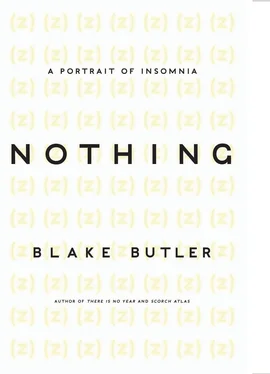Around the house inside these changing I trudged from room to room through disparate hours of the night, crying through the hallways asking anybody, god or whoever, just to shut me down, undo my time. Standing in the kitchen on the far side of the counter from my mother in a late light and her looking at me, speaking, as if from several hundred years away. Less than the words she spoke then, I remember the sound that surrounded all the air around me and between us, the slight shake of my frame inside my frame, and of the frame of house around me, and the air around that, layers quaking, full of night. Sometimes back inside my bedroom again hours later, as if time had not passed, I’d get the feeling that all the doors inside the house, all houses, had come open, and anything then was able to go out or come in. There comes, in the carving out, a sight — a slightly buttered color and sound that makes the old rooms, from sudden angles and in their constant whorled, unfurling periphery of, an occasional translucent texture, new.
This can be, in the excess of hours, and as days flip brutally slower along in the manner of a single, quick, enormous day, a pronounced prance, an unwinding. The hours might extend to form new rooms hidden somewhere in the make of homes, deeper sofas, thicker books, wherein the earth, for all its air, seems as if extremely conscious of the presence of your you , as if returning, for all the ways you’ve walked and rubbed upon its surfaces, an objectless, surfaceless, hidden embrace. If anything, the slow down invites a silence, as if lying down while standing up. The brain taking the brain over. A raw relaxing. “In its early stages, insomnia is almost an oasis in which those who have to think or suffer darkly take refuge.”131 You begin to see yourself inside yourself — can almost see, as if from overhead, or in following your body down corridors, in halls, the way your shape reacts to what is set before it. You count the sounds that you give out — even if, at the same time, it becomes less possible to stop them, fix the slip of your control. The hours go on longer, but you milk less from them. There is sound. You might hear buttons getting pressed behind you, and yet, in turning, the air is there. An autopilot popping through the spine and frame meat that, in sudden heaving moments, comes back upon size — the moments others might, then, disappear into their sleep.
On the fourth day of full waking I saw inside my bedroom wall there appear the face of a small man. His forehead neon, bulged from the tan paint. His eyes empty in a gray way. His voice speaking to me in a language I sometimes still even now can hear: no words but in bloating, a kind of sound inside sound spreading out like an outdoor artificial light would in the mass sunlight of a day. This speech in my remembering, ten years later, sounds like nothing, though I can see the head, can feel the head still in my chest, and even feel the susurration of the sound waves pillowed through my chest in certain hours again awake too long in different light with longer bones — there is no word about the word at all except its speaking, saying nothing — a mode of color in woven tone.
For long hours in the colorless stretches I would stumble through the house or go on lying, cursing me and cursing god — both felt the same. My body moved still by my impulse but at the same time as if strung ahead by ghostly ropes, my brain aware and spinning but with someone else’s speaking: heads inside of head. Just as there may seem shaken doors inside the landscapes, there become shaken doors with the flesh. A sudden urge to stand and move into the next room, the air there as if someone other had just left it, or is coming in. In the night there might be near the window the sound of speaking, or of doorknobs being turned. Notes to self appear in pockets, writings in the linings of the books. Or perhaps, as in my case, writing along the arms and hands — the body’s tablet, ever-present — if coming out in syllabic strings impossible to parse from one brain to the other. These are truly separate brains — though brains encased within the same head, at some points overlapping, some remote. Someone not you pressing the buttons there between them, turning curtains, hanging new. Deletions suddenly appearing in texts you’ve written. From texts on shelves. As if living in a life full of deleted scenes, a disc cut from a room there buried deep — and at the same time not at all buried, but laid upon the light. New gaps then there appearing slowly between the uncovered stations. Time learns to pass not from A to B, but in a small series of loops. This hour might last a half of an hour, or a half of half, some fraction thereof and therein — the time expended, say, in sitting down behind the car’s wheel to begin driving and noticing the new gaps appearing on the LCD — while this other hour, lying face up on the floor beside one’s bed, the light overhead attached to some spinning ceiling fan, perhaps, light clearly disseminating from two spherical shapes hidden underneath a glassy dome, might last twelve hours. Clicking off in reams of quiet rope, bunching up inside the body in weird weak points, sudden soring. Where have I been all night? This kind of time continuity distortion also appears in the way of dreaming — some sleep scenes come on embedded in the head seeming to go on for a whole life, trapped inside there as if no way out, as if this is where we’ve always been, whereas other nights the light inside will seem to burn only several minutes and yet we will wake up into a new room, very dry, a whole night and then some having slipped off in disturbed duration. Relativity, in this way, is old — it is not so much a question of experience and how one feels it as an actual variation on a theme, the blink modes breaking up, becoming arpeggiated, shifting between modes — the way a record might be blipped back and forth between speeds, slurring the voice sound there, pulling the notes, making a new song out of something other, the music burned into black synthetic circles, replicated planes.
Eventually, inside of troubled sleep, the sleeping and not sleeping begin to feel the same. There is a heat — a lack of heat — about the air that seems to vibrate just around you, for the pockets of the house where you are not. The constant thought of the current moment leads to the next moment, killing whole long loops in serial blanking from door to door to door. For all those hours spent horizontal, faking, trying, I don’t seem to remember breath ever going in or coming out. Some time in the hold you might stand and look out the window at the other houses, still and silent, most extinguished, probably no other bodies moving, all seem asleep. The houses in these times seem cowering, curled down against the earth under a sky that does not blink. The black sky, where from inside cities there are rarely constellation objects but the strong ones, the arcs of trudging object bodies trolling data in an atmosphere that smothers selves, where between these blips of passive wanting, most of the hours herein feel the same, feel not there or simply pausing, no time passed, no new song.
That year the New Year that year came and went in no mode — more awake and more asleep than ever both at once. I remember my girlfriend calling from a party as the date changed, surrounded by a screaming celebration, other cells, while against my face the phone hung on, a thick thing, like a face itself again with no mass, beyond my room, my body radiating heat in pillows, which when I lay down in sunk around me, mushing my sheets into moist curtains among which I’d lurch and flop. In some ways, the house around the unsleeping body begins to become another house. Oftentimes, among the slurring, the mouth might not even open, confining in the sound: sound meant to be ejected into others remains inside the self, banging in against the inner walls, perhaps in some soft spots causing distortion, puffing out of limbs or in small pockets. Imagine living on the backside of the flat face of a clock. The air at times like something remained in the space pressed out of a very old or very thin balloon. The way an aching might arise from lying wrong or on unforgiving surface, the muscles and flesh bumps grow hidden bruises. The reactions slower. The nodding dulled off. Knobs on knobs. Touching doors to make them open and therein finding not even the handle will make them turn. Even these qualities are hazy in their defining, as the closer on your touch the less it seems to want to grab.
Читать дальше












